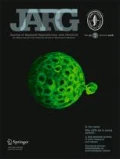References
Walker LC, Herndon JG. Mosaic aging. Med Hypotheses. 2010;74:1048–51.
Ben-Haim MS, Kanfi Y, Mitchell SJ, Maoz N, Vaughan KL, Amariglio N, et al. Breaking the ceiling of human maximal life span. J Gerontol A Biol Sci Med Sci. 2018;73:1465–71.
Lubinsky M. Evolutionary justifications for human reproductive limitations. J Assist Reprod Genet. 2018;35:953–7.
Gaillard J-M, Lemaitre J-F. The Williams’ legacy: a critical reappraisal of his nine predictions about the evolution of senescence. Evolution. 2017;71:2768–85.
Templeman NM, Luo S, Kaletsky R, Shi C, Ashraf J, Keyes W, et al. Insulin signaling regulates oocyte quality maintenance with age via cathepsin B activity. Curr Biol. 2018;28:753–760.e754.
Tidière M, Gaillard J-M, Berger V, Müller DWH, Bingaman Lackey L, Gimenez O, et al. Comparative analyses of longevity and senescence reveal variable survival benefits of living in zoos across mammals. Sci Rep. 2016;6:36361.
Ellis S, Franks DW, Nattrass S, Cant MA, Bradley DL, Giles D, et al. Postreproductive lifespans are rare in mammals. Ecol Evol. 2018;8:2482–94.
Hawkes K, O'Connell JF, Jones NG, Alvarez H, Charnov EL. Grandmothering, menopause, and the evolution of human life histories. Proc Natl Acad Sci U S A. 1998;95:1336–9.
Brent LJN, Franks DW, Foster EA, Balcomb KC, Cant MA, Croft DP. Ecological knowledge, leadership, and the evolution of menopause in killer whales. Curr Biol. 2015;25:746–50.
Cant MA, Johnstone RA. Reproductive conflict and the separation of reproductive generations in humans. Proc Natl Acad Sci U S A. 2008;105:5332–6.
Croft DP, Johnstone RA, Ellis S, Nattrass S, Franks DW, Brent LJN, et al. Reproductive conflict and the evolution of menopause in killer whales. Curr Biol. 2017;27:298–304.
Lahdenperä M, Lummaa V, Helle S, Tremblay M, Russell AF. Fitness benefits of prolonged post-reproductive lifespan in women. Nature. 2004;428:178–81.
Wyshak G, Frisch RE. Evidence for a secular trend in age of menarche. N Engl J Med. 1982;306:1033–5.
Nichols HB, Trentham-Dietz A, Hampton JM, Titus-Ernstoff L, Egan KM, Willett WC, et al. From menarche to menopause: trends among US women born from 1912 to 1969. Am J Epidemiol. 2006;164:1003–11.
Kallen A, Polotsky AJ, Johnson J. Untapped reserves: controlling primordial follicle growth activation. Trends Mol Med. 2018;24:319–31.
Han L, Ren C, Li L, Li X, Ge J, Wang H, et al. Embryonic defects induced by maternal obesity in mice derive from Stella insufficiency in oocytes. Nat Genet. 2018;50:432–42.
Mendes CC, Mirth CK. Stage-specific plasticity in ovary size is regulated by insulin/insulin-like growth factor and ecdysone signaling in Drosophila. Genetics. 2016;202:703–19.
Acknowledgments
The author thanks his colleagues Patrícia Beldade (Gulbenkian Institute, Portugal), Ana Virgolino (Institute of Environmental Health, Faculty of Medicine of the University of Lisbon, Portugal), and Osvaldo Santos (Institute of Environmental Health, Faculty of Medicine of the University of Lisbon, Portugal) for suggestions that greatly improved the manuscript.
Funding
Paulo Navarro-Costa is supported by the Portuguese national funding agency for science, research and technology (Fundação para a Ciência e a Tecnologia, grant PTDC/MEC-AND/30221/2017).
Author information
Authors and Affiliations
Corresponding author
Rights and permissions
About this article
Cite this article
Navarro-Costa, P. A (micro)environmental perspective on the evolution of female reproductive aging. J Assist Reprod Genet 35, 2129–2131 (2018). https://doi.org/10.1007/s10815-018-1355-6
Received:
Accepted:
Published:
Issue Date:
DOI: https://doi.org/10.1007/s10815-018-1355-6

